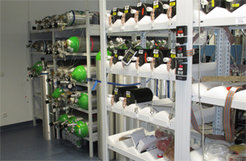ICOS ERIC establishment: a strong EU message towards COP21

The European Commission has officially established the Integrated Carbon Observation System (ICOS ERIC), a new pan-European environmental research infrastructure which aims to provide long-term carbon and greenhouse gas observations across the Europe. The ICOS ERIC has been established with eight founding members: Belgium, France, Germany, Italy, Netherlands, Norway, Sweden and Finland, which is the ICOS ERIC hosting country, as well as Switzerland which currently has an observer country status. The ICOS ERIC is the 12th European Research Infrastructure Consortium that has been established since August 2009 when ERIC legal framework was provided. The ICOS RI has successfully completed almost a decade long process from entering the European Commission ESFRI Roadmap to establishment of the ICOS ERIC.
Commenting on the importance of the ICOS ERIC establishment Director General for Research and Innovation at the European Commission, Robert-Jan Smits has said: “By facilitating long-term pan-European carbon and greenhouse gas observations, the European ICOS Research Infrastructure will provide invaluable knowledge to support the European and global efforts of reaching safe climate change mitigation goals. It is therefore excellent news that ICOS has been allocated the status of ERIC. The timing for this is perfect, just before the UN COP21 in Paris, which is yet another clear message from the EU about its commitment to the climate targets.” The ICOS ERIC inauguration will be held in Brussels on Tuesday 24th November when Robert-Jan Smits will hand out the official plate to the Finnish Minister of Education and Culture Sanni Grahn-Laasonen and ICOS Director General Werner Kutsch in the presence of the hosting country delegation.
About ICOS RI
ICOS is a distributed research infrastructure that provides harmonised European-wide measurements on carbon cycle, on greenhouse gas emissions and on atmospheric concentrations of greenhouse gases. The ICOS RI integrates atmosphere, ecosystem and ocean greenhouse gas monitoring networks in order to provide the observational basis for a full European carbon balance and its trends. Standardized measurements are carried out throughout Europe - at tall atmospheric towers and ecosystem sites from the Artic to the Mediterranean, as well as on ocean platforms and vessels covering the North Atlantic, the Mediterranean Sea and the Baltic Sea.
Each network is coordinated by its Thematic Centre responsible for data integration and processing, centralized quality control, network training and data transmission. ATC - Atmosphere Thematic Centre is based in France and Finland, ETC - Ecosystem Thematic Centre is based in Italy, Belgium and France and OTC - Ocean Thematic Centre is based in Norway. The CAL – ICOS Central Analytical Laboratories are based in Germany and provide accurate reference gases to the networks and perform additionally high precision analyses of air samples.
The ICOS RI’s main operational Head Office is based in Helsinki, Finland whilst its central data portal, called Carbon Portal, is based in Sweden and will make all ICOS data freely available and produce higher-integrated knowledge products.
Contribution of the Max-Planck-Institute of Biogeochemistry
Within the strong and manifold national activities, involving almost 30 monitoring stations of all resorts (Atmosphere, Ecosystems ,Ocean), Germany supports this Europe-wide activity with the provision of the network’s Central Analytical Laboratories (CAL): the Central Radiocarbon Laboratory (CRL) at the University of Heidelberg and the Central Flask- and Calibration Laboratory (FCL) operated by the Max-Planck-Institute for Biogeochemistry in Jena. Thereby the FCL in Jena is in charge for the provision of certified reference gases and the supplemental analyses of gas samples collected at Class1-monitoring stations. These tasks shall ensure compatibility of the Europe-wide collected data, quality assurance of the monitoring stations by comparison and round robins and will provide extensive analyses that cannot be performed with desired precision in the field yet. Therefor the FCL is linked to the scale of WMO’s Global Atmospheric Watch (GAW) and designed for an annual capacity of several thousand flask air samples.
What are research infrastructures?
Research infrastructures are facilities, resources and related services used by the scientific community to conduct top-level research in their respective fields, ranging from nanotechnologies and genomics to astronomy and environment. Their development has been coordinated through the European Strategic Forum on Research Infrastructures (ESFRI) since 2004. ESFRI is a strategic instrument to develop the scientific integration of Europe and to strengthen its international outreach.
What is ERIC?
ERIC stands for European Research Infrastructure Consortium. It is a European legal instrument that was adopted by the Council of the EU in 2009 to facilitate the establishment and operation of European Research Infrastructures on a non-economic basis. ERIC endows research infrastructures with a legal personality recognised in all Member States. ICOS ERIC is the 12th European Research Infrastructure Consortium that has been established since August 2009.
PRESS CONTACT:
Gorana Jerkovic
ICOS RI Communications Coordinator
Email: gorana.jerkovic@icos-ri.eu
gorana.jerkovic@helsinki.fi
Web: http://www.icos-ri.eu
Contact ICOS-FCL Jena
Dr. Armin Jordan
Ph.: +49 (0)3641- 57 6403
Email: ajordan@bgc-jena.mpg.de
